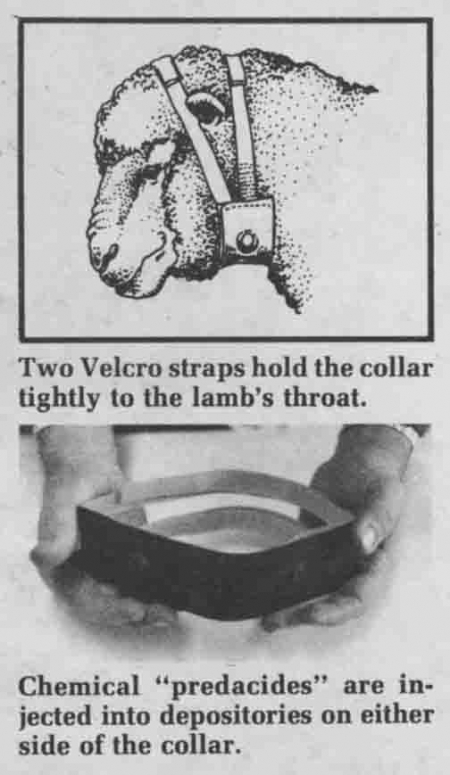
Coyote poisons have been banned in the United States for the past 10 years but, thanks to a recent ruling by the Environmental Protection Agency, they'll soon be back on the market. The coyote killing tool most likely to take over the market is a collar developed by Texan Roy McBride, owner of Rancher's Supply Inc., Alpine.
The coyote killing collar is sold now throughout the world, primarily in Mexico, Canada and South Africa (for jackals). It's made out of black rubber that has two soft depositories in it for the injection of poison. Two Velcro straps fasten them to sheep necks.
"Coyotes always go for the throat. When they attack, they break open-the collar and the poison kills them. Unfortunately, they kill the sheep in the process. The beauty of this method is that it only kills the coyotes that attack livestock, and there's only enough poison in the collar to kill the attacking coyote so other animals that feed on the body of either the dead sheep or coyote will not be adversely affected," McBride told FARM SHOW.
The government banned use of Compound 1080 in 1972 on the grounds that it posed a hazard to animals other than coyotes. The ban came up for review in 1981. During those years there has been no legal "predacide" available in The U.S. for combating coyotes, although companies in the U.S. make poisons like 1080 and ship them overseas.
McBride's collar is 8 in. long and 2 in. wide, completely covering the throat of a sheep or goat from ear to ear. When coyotes attack a flock of sheep, they almost always kill the lambs first so, to protect an entire flock, McBride says you only have to put collars on the lambs.
"If you know there is a coyote problem in a certain area, you can put a few lambs with collars in with a flock of ewes and, when the coyote goes for the lambs, it'll be killed. A handful of collars can be used to protect large flocks of sheep," says McBride.
The collar is good for either sheep or goats. The chemical 1080 is sold by the gallon. When the final use permit is approved for the collar -- probably in the next few months -- McBride will probably sell the collar with the chemical already in the collar.
